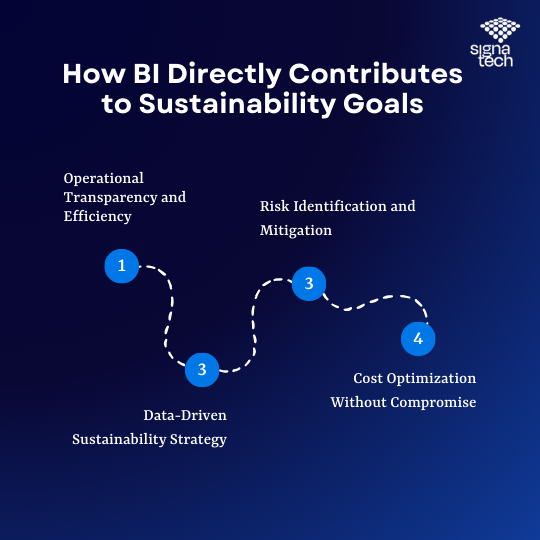Business sustainability exists as both an obligation and a sound operational approach in the market. Businesses throughout all sectors recognize that sustainable corporate growth needs revenue success alongside effective and honorable operational methods.
But how do you strike the right balance between performance and purpose?
How can your business stay profitable while being mindful of its environmental and social impact?
This is where Business Intelligence (BI) comes into play: BI is more than just pieces of data in dashboards and reports, it’s a strategic tool that allows you to find insights, eliminate waste, streamline operations, and make decisions that are good for your growth and the planet. BI tools for sustainable business are becoming a critical asset in helping companies achieve this balance effectively.
Let’s explore how Business Intelligence can power a more sustainable future for your business.
Understanding the Link Between BI and Sustainability
Business sustainability refers to the process of creating long-term plans for business impact that are in harmony with ESG (Environmental, Social, and Governance) metrics. It’s about optimizing our operations, managing risk, and creating value for all of our stakeholders — not only our shareholders.
Business Intelligence, on the other hand, turns raw data into actionable insights. It provides leaders with a comprehensive view of their operations, allowing them to spot inefficiencies, forecast trends, and make informed decisions. In several ways, BI tools for sustainable business serve as a major enabler of sustainable growth when aligned with sustainability objectives.
How BI Directly Contributes to Sustainability Goals

1. Operational Transparency and Efficiency
BI platforms provide real-time visibility into resource consumption, supply chain performance, and operational bottlenecks. By tracking key metrics like energy usage, waste generation, and logistics efficiency, organizations can quickly identify where improvements are needed — and implement them with measurable results.
Example: The BI system of a manufacturing company enables tracking of energy consumption patterns across different facilities. The analysis of consumption patterns helps organizations detect areas with high usage levels to implement specific energy-saving initiatives which lowers expenses and decreases environmental emissions. BI tools for sustainable business are vital in helping such companies monitor efficiency metrics continuously.
2. Data-Driven Sustainability Strategy
Accurate measurement stands essential for the meaning of sustainability goals. BI tools enable businesses to monitor their ESG indicators including carbon footprints and diversity metrics through single unified dashboards. Leadership gains valuable knowledge through these insights to fulfill regulatory standards while keeping stakeholders both inside and outside the organization properly informed.
Example: The retail chain can track sustainable supplier procurement rates through BI systems to identify product categories that fall short of their sustainability targets.
3. Risk Identification and Mitigation
Businesses that aim for sustainability develop their structure from a predictive perspective. Organizations leverage BI tools to foresee upcoming supply chain interruptions and regulatory threats and market alterations so they can respond before situations deteriorate. Proactive risk management through this approach lowers financial expenses and protects organizational reputation.
Example: BI tools enable logistics organizations to predict fuel shortage disruptions along with environmental regulation changes so they can modify delivery routes or implement alternative transport solutions. These predictive insights are one of the hallmarks of BI tools for sustainable business.
4. Cost Optimization Without Compromise
Through BI organizations can maximize budget efficiency by finding which assets perform poorly and which departments operate inefficiently and which processes need elimination. Through this system companies can maximize their resources to achieve more objectives while maintaining high standards of performance.
Pain Points Business Leaders Face (That BI Helps Solve)
Many business leaders want to adopt sustainable practices but struggle with:
-
- Lack of visibility into ESG metrics across departments.
- Difficulty aligning sustainability with profitability.
- Slow, manual reporting processes that delay strategic decisions.
- Inability to forecast long-term impact of sustainability initiatives.
- Pressure from regulators, investors, and consumers to show transparent, data-backed sustainability performance.
BI tools for sustainable business solve these problems through their ability to create quick and insightful goal achievements.
Why Business Intelligence Is Key to Long-Term Success
The future will reward organizations that successfully adapt their business operations to market trends and global ethical standards as well as sustainability responsibilities. Financial investors now evaluate the ESG performance of companies. Customers are demanding transparency. Public authorities have established stricter standards for compliance.
BI offers a strategic edge by allowing companies to:
-
- Make smarter, faster, evidence-based decisions.
- Build trust with stakeholders through measurable sustainability reporting.
- Turn sustainability from a compliance requirement into a competitive advantage.
How Signatech Supports BI-Driven Sustainability?
Signatech provides businesses with tools to merge Business Intelligence solutions into their sustainability frameworks. Our solutions merge expert data analytics with ethical innovation practices to create well-defined measurable results.
With Signatech, you can:
- Build custom BI dashboards tailored to your industry and goals
- Monitor and report ESG ( Environmental, Social, and Governance ) metrics automatically
- Analyze long-term impact of sustainability initiatives
- Forecast and simulate strategies using predictive analytics
Signatech supports organizations in their sustainability framework development process through data-driven decision-making, powered by the right BI tools for sustainable business. Our Business Intelligence Consulting Services are designed to support every phase of this transformation.
Let’s Build a Smarter, More Sustainable Future
Contact our BI consultants right now to discover how Signatech can integrate sustainability throughout your business strategy framework.
